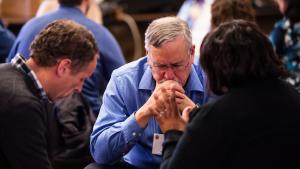Four University of Michigan faculty, all in the Department of Electrical Engineering and Computer Science (EECS), have been meeting for several years as a faculty prayer cell. The following article describes their experiences and some advice for faculty seeking to pray with one another.
"Since we have confidence to enter the Most Holy Place by the blood of Jesus, …and since we have a great high priest over the house of God, let us draw near to God with a sincere heart in full assurance of faith …And let us consider how we may spur one another on toward love and good deed. Let us not give up meeting together, as some are in the habit of doing, but let us encourage one another – and all the more as you see the day approaching." Hebrews 10: 19-25
For the last several years, we have been meeting weekly as a group of Christian faculty in one of our offices in order to pray for one another, for our colleagues and students, and for the University of Michigan. Our little gathering has lasted only 30 minutes, though, at times, we may have lingered in conversation for 45 minutes. All of us have found this time to be spiritually enriching and stimulating. In fact, it has been valuable enough that we would like to commend this practice to our colleagues in the wider university.
Our format has been unstructured and casual; we usually spend a bit of time sharing concerns, and then we pray. Our time together has been directed by three agreed upon guidelines:
We make an intentional effort to talk and pray about issues relating to our Christian experience as academics. We certainly do pray for any significant issue that arises, and over time we have naturally felt increasing freedom to pray about personal and family needs. But, because we feel a profound vacuum of prayer for the university, we seek to focus on the kingdom of God at the university. Our prayers often center on our students, our teaching, our interaction with colleagues, opportunities for Christian witness in word and deed, our desire (growing we hope!) that our work gives glory to God, for the administration of our department and the university, and that our work have the proper place and importance in our lives.
We have occasionally talked together, sometimes at length, about what it means to be a Christian and a faculty. How do we submit all of the many demands that we feel as faculty to the Lord? How do we remain aware of the presence of God with us in our vocation? How do we give glory to him through our work?
We try to make a point of not sharing or discussing to such an extent that we don’t get time to pray together. This is no small discipline when our gathering last only 30 minutes. Sometimes our whole time has been taken up in conversation, but we intend to maintain prayer as our focus.
We are no more “spiritual” than any other grouping of Christian faculty, so we ought to offer some account of why we have begun and persisted in this sort of prayer gathering. Here, at least, are three such reasons:
- Four practicing Christian faculty were clumped into two hallways in the Engineering building. It seemed providential. “Given this, it seemed almost an act of defiance against God not to meet together somehow.” Not all will find themselves in such fortuitous proximity to other believers, but none of us is all that far from other believing colleagues.
- We have come to believe that we need reminders of who we are as believers, especially in an all-engrossing environment like the university. By meeting, we receive just such a reminder, regardless of the particular things we bring to the Lord in prayer. By taking time (perhaps our most precious commodity) out of already busy schedules we remind ourselves that all our time belongs to the Lord and not to our academic career. By sharing about how our faith relates to and can shape our work, we remind ourselves that our purpose is not just to publish papers. And as our conversation and prayer focuses on the concerns raised by our faith for our life as academics, we have found direction as we seek to follow the Lord Jesus in this wonderful university setting.
- Hosting our gathering has turned out to be, on the whole, not a nuisance but refreshing. It feels like our spiritual life is invading our work life (as it should) and that this place, too, can be holy ground.”
Here is a grocery list of things to do to make such a prayer cell function in your neighborhood:
Identify a core of “regulars.”
In our case, in EECS, this was easy. It may be a bit more complicated in other parts of the university, but being in as close a physical proximity as possible seems wise.
Schedule an agreeable 30 minute time slot to meet weekly.
Again, this is clearly often a challenge. Scheduling before the semester begins is helpful. Once, we could not find a free 30 minute time among our core of four faculty. In the end, we still found a time by moving a meeting. In the end, we do those things we think are important. We believe that this is important.
Send out a “hand typed” invitation/reminder to the group each week.
We found that just having it on calendars or even receiving an automated reminder is very ineffective in getting people to show up. Faculty are busy. However, when one faculty takes time to write an email reminding everyone of our meeting, it seems to help.
Make it a policy to be continuously inviting new folk to join you.
Take time in an early meeting to think through colleagues who would appreciate an invitation and divide the inviting among your core people. Renew this conversation a couple of times each semester.
It has been fruitful when one of us has come prepared to read a short passage of Scripture to focus our thoughts. This responsibility should be shared among members.
Finally, of course, meet and pray even if it is just two of you. Remember the Lord Jesus himself said, “For where two or three come together in my name, there am I in their midst.”



